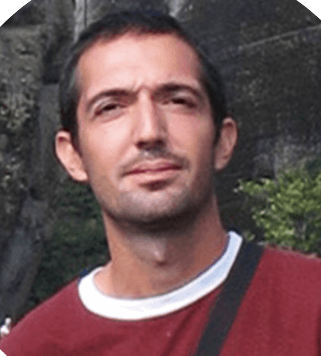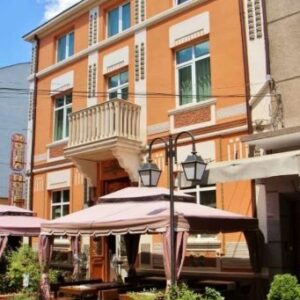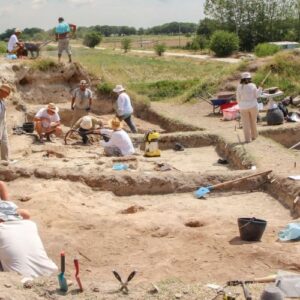2025 Bulgaria tell yunatsite:
Early Neolithic at the Balkan Peninsula
Closed
Jul 12-Aug 9, 2025
Archaeology
Prof. Kamen Boyadzhiev
$4,560
Apr 4, 2025
June 7, 2025, at 8:00am Pacific Time
8 Semester Credit Units
Program Full
OVERVIEW
During the 7th-6th millennia BCE, farming and animal husbandry spread from Anatolia and the Near East through the Balkan Peninsula and to Europe. These were not new technologies adopted by local populations but newcomers who brought a completely new way of life and subsistence, initially co-existing and then taking over local populations. By the 6th millennium BCE, the local economy, social organization, trade, and cultural contacts evolved, to reach its peak in the 5th millennium BCE. Even newer technologies came to bear, when locals begin processing – and using – metals such as copper and gold.
Recent excavations at Tell Yunatsite indicate that the Chalcolithic/Final Neolithic period settlement at the site covered an area far larger than the tell itself. The site had an uptown (acropolis?) sector and a downtown district. The uptown sector was surrounded by a five meter wide clay wall and a broad and deep ditch. Buildings in this part were placed close to each other, creating an almost unbroken urban fabric that is easy to close and defend.
Despite their defensive resource investment, the Chalcolithic/Final Neolithic settlement at Yunatsite experienced a violent event at ca. 4,200-4,100 BCE. Evidence suggests deliberate destruction by outsiders. Skeletons of children, elderly men, and women were found scattered on floors, suggesting a massive massacre. Those who survived returned and resettled at the tell, but soon even they left. At that point, Tell Yunatsite and the area around it were abandoned for more than 1,000 years. During this time, a sterile layer accumulated over the last Chalcolithic/Final Neolithic layer.
The archaeological field school takes place at the Tell Yunatsite lowest excavated layer, which corresponds to the time of Europe’s first prehistoric civilization in the 5th millennium BCE.
Instructors
All field school directors are experts in their field and passionate about their work. To discuss the suitability of this program for your career goals – whether within or outside academia – you are invited to contact the directors directly. For a broader discussion which CFS program to choose, you are welcome to contact our staff directly – you can do that through our “Contact Us” page.

Prof. Kamen Boyadzhiev
Bulgarian Academy of Sciences
Testimonials
This is a new CFS program. No student evaluations are available.
student fees (tuition)
what is covered
-
DEPOSIT IS PART OF TOTAL TUITION COST
-
Costs of Instruction
-
Room & Board
-
Cost of Academic Credit Units
-
Cost of Health & Liability Insurance
read before you pay
- Application: You must apply online for this program – application is free
- Deposit: A $300 nonrefundable deposit (part of the total tuition cost) is required to secure a space in the program
- Credit Card Fee: Payments with credits cards incur 2.5% processing fee
- Late Fee: A $100 Late Fee will be added to the program costs if tuition is not paid in full by payment deadline
- Cancelation Policy: Carefully read our Cancelation Policy before committing to attend our programs
- Trip cancellation Insurance: Trip cancellation insurance is not provided by CFS. Such policies have changed due to Covid 19. If you wish to purchase an insurance policy that covers pandemic contingencies, explore Cancel for Any Reason (CFAR) plans. Insuremytrip or Travel Guard are possible websites where you may explore different insurance policies
Accommodations

Students will stay at the Hotel Primavera, in comfortable rooms with two to three beds (bathrooms with shower and WC, TV, A/C and free Wi-Fi). The hotel is in the central pedestrian and shopping area of Pazardzhik, close to the many services the town can offer (shops, pharmacies, banks, markets, taverns, restaurants, bars, bars, hospitals, cafes, post offices, tourist attractions, parks etc.). Participants are not expected to bring any additional equipment, bed linens or towels.
diet

Three meals – organic Bulgarian homemade food – will be served. During workdays, meals usually take place at the site. During the weekend, meals will take place at the hotel’s restaurant (except the brown-bag lunches during the excursions). This field school can accommodate vegetarians, vegans, and individuals with lactose intolerance. Kosher and gluten-free diets are impossible to accommodate in this location.
travel information
We suggest you hold purchasing airline tickets until six (6) weeks before the program begins. Natural disasters, political changes, weather conditions & a range of other factors may require the cancelation this field school. CFS typically makes a final Go/No Go decision about six weeks before the field school begins. To protect students from potential financial loss, we urge students to purchase airline tickets only six weeks prior to program beginning.
Students can make their way to the Hotel Primavera on their own, or use a shuttle service reserved by the project director.
The shuttle service will depart Sofia Airport Terminal 2 arrival area at 5:30pm on Sunday. The cost is 90 Bulgarian Lev (approximately $60) – depending on the number of students who choose to use this service. The cost must be paid in cash.
visa information

There are no special visa requirements for U.S. citizen travelling to Bulgaria, as long as they do not stay longer than 3 months. Passport’s expiration date should exceed the stay by at least 3 months.
Citizens of other countries are asked to check the embassy website page at their home country for specific visa requirements.
Meeting Point
| Date | Time | Location |
|---|---|---|
| July 12, 2025 | 5:30pm | Sofia Airport, Terninal 2 Arrival Area |
Safety
Our primary concern is with education. Traveling and conducting field work involves risk. Students interested in participating in our programs must weigh whether the potential risk is worth the value of education provided. While risk is inherent in everything we do, we do not take risk lightly. We engage in intensive review of each field school location prior to approval. Once a program is accepted, we review and monitor each program annually to make sure it complies with all our standards and policies, including student safety.
Students attending our international programs are covered by a comprehensive Health Insurance policy that includes physical illness or injury, mental or chronic conditions. There are no deductible and 100% of costs are covered up to $250,000. In addition, we provide Political & Natural Disaster Evacuation policy, which allow us to remove students from program location if conditions change.
Students attending our domestic programs (within the US) must have their own health insurance and provide proof upon enrollment. Program directors are familiar with local authorities and if in need of evacuation, local emergency services and/or law enforcement will be notified and activated.
We have an explicit and robust harassments & discriminations policies. If students feel they cannot discuss personal safety issues with program staff, they are welcome to call the CFS emergency hotline and talk directly with CFS staff members.
Call (+1 562 584-0761) or email (info@fieldsciences.org) if you have questions about the safety of any program.










